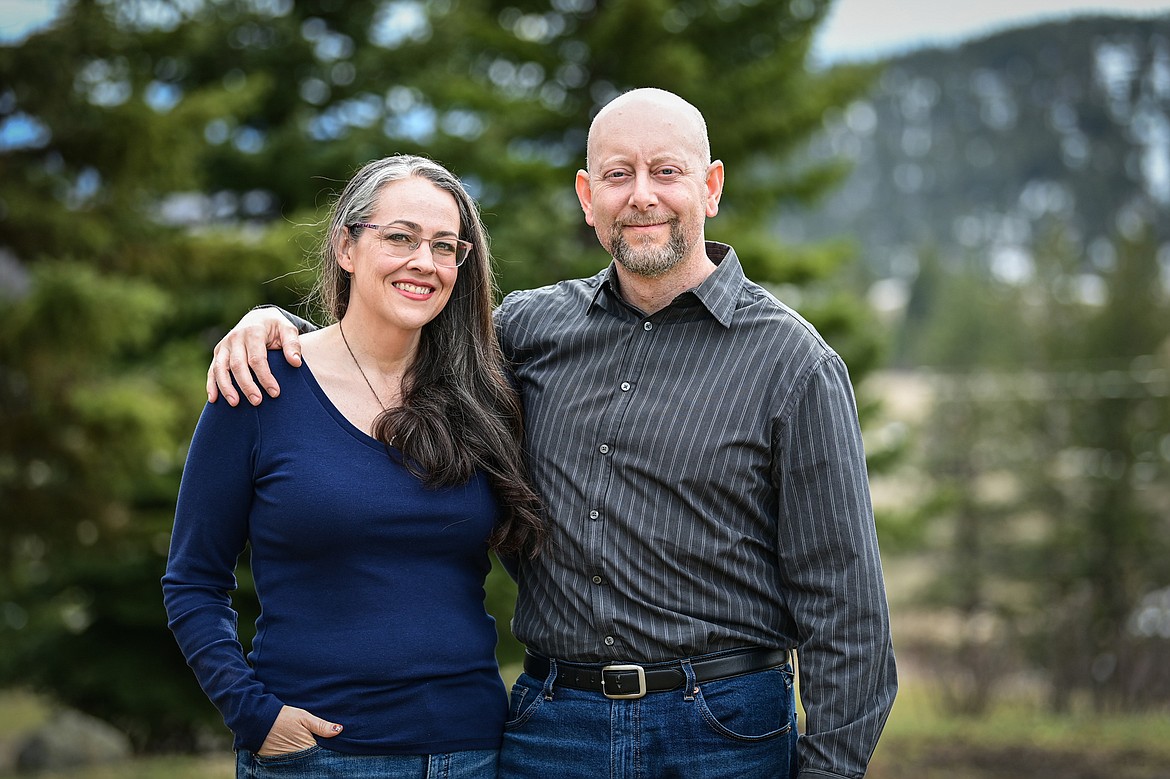Montana politicians turn a critical eye toward IVF treatments following Alabama ruling
KATE HESTON | Hagadone News Network | UPDATED 1 year, 7 months AGO
Kate Heston covers politics and natural resources for the Daily Inter Lake. She is a graduate of the University of Iowa's journalism program, previously worked as photo editor at the Daily Iowan and was a News21 fellow in Phoenix. She can be reached at [email protected] or 406-758-4459. | May 19, 2024 12:00 AM
Kalispell resident Margo Nieman remembers everything it took to get pregnant — medications, money and time spent worrying if her attempts at a baby through in vitro fertilization would work.
“I desperately wanted to be pregnant. I wanted to feel the baby grow inside me, I wanted to be able to take care of it in that way and bond with it, and just go through that whole thing with my husband,” Nieman said.
Nieman recently has been reflecting on her journey in light of an Alabama Supreme Court decision that temporarily limited access to IVF in that state.
In a Feb. 16 ruling, the Alabama Supreme Court declared that embryos created through IVF are children, a decision with stark implications for embryos remaining in the process.
Several of the state’s hospitals and clinics temporarily halted IVF services as a result. Lawmakers, doctors and advocates in Montana and across the country raised concerns about the impacts the decision could have elsewhere.
The case generated concern nationally until March when the ruling was ultimately amended to grant civil and criminal immunity for IVF service providers and receivers, allowing many clinics to restart treatments. Experts say it will take more work to fully protect fertility services in the states.
Protecting fertility services is essential for Montanans — especially in a state where access to IVF treatments is limited to begin with, Nieman said.
She received her treatments in Seattle while she and her husband Cliff lived in Washington. But in Montana, people travel to Spokane or Bozeman to get IVF treatment. Dr. Stacy Shomento is the only provider who administers it in Montana and she practices at Billings Clinic Bozeman.
Nieman said the couple spent about $40,000 on IVF over several years, which included three different transfers of embryos — where fertilized embryos are placed in the uterus.
Getting to that final step is a long and arduous process, she said.
The IVF cycle begins by using lab-made hormones to help the ovaries release multiple eggs, according to the Mayo Clinic.
Sometimes women have to start over again for a multitude of complications, for example if ovulation happened too soon or too many follicles developed, raising the risk of ovarian hyperstimulation syndrome.
“I've had canceled cycles, just because something wasn't looking right in my blood work,” Nieman said. “Besides the emotional toll, you're pushed back — you start over, you pay extra money, because they've already done monitoring, and you've already used medications, and you have to go back and do all that all again.”
The next step in the process is fertilizing and transferring the embryos.
Nieman and her husband were managing their expectations, she said. Friends had undergone IVF without success. They decided to try two embryos on the first transfer, a move her doctor warned her about — pregnancy with twins always carries higher risks, especially as women get older. Nieman was 36 years old when they did her embryo transfer.
Nieman was anxious throughout her pregnancy, especially since she had already had issues with an ectopic pregnancy, where a fertilized egg begins growing outside of the uterus.
Despite the risks, Nieman gave birth to healthy twins. She would later have a second successful transfer, leading to the birth of a son. There was still one more viable embryo that the couple was paying to store, which they eventually opted to try as a transfer to no avail.
Nieman said in Washington, patients must choose to pay for the storage of their embryos, give the embryo to another IVF patient, give it to medical research or dispose of it. Health care providers cannot make decisions about the embryos on behalf of the patient.
Nieman said she is grateful that her IVF pregnancies were successful and that she no longer has any embryos to store. She can’t help but feel sad for women going through the process currently, especially if the procedure continues to draw attention from lawmakers.
MONTANA LAWMAKERS are split when it comes to protecting the process.
Gov. Greg Gianforte said in a statement that he opposes restrictions on IVF.
“The governor knows that many Montana families, who have struggled to conceive, have turned to IVF and fertility treatments to have children and grow their families. He opposes restrictions on IVF treatments,” a spokesperson for Gianforte said.
They also noted that “we need to promote a culture that values life from conception to natural death.”
But when Gianforte served as the state’s representative at large in 2017, he co-sponsored a Life at Conception Act, which looked to guarantee the right to life for a human being at all stages, including fertilization — the same belief at the crux of the recent Alabama Supreme Court ruling.
Ryan Busse, Gianforte’s Democrat opponent for governor, said he supported the treatment.
“It’s not my business to be in the doctor’s office with women and couples to decide when they want to have a family,” Busse said.
Tanner Smith, a Kalispell Republican gubernatorial candidate, saw room for regulation.
“I believe that life begins at conception, and we're wading into murky waters right now,” Smith said. “There needs to be some kind of restriction on IVF, just to keep the bad actors out of it.”
Some valley lawmakers agree with Smith’s sentiment. Republican state Sen. John Fuller told the Inter Lake that he is working with a family to bring legislation forward that would “put sideboards” up for IVF so the state does not engage “in wholesale embryo slaughter.”
“I realize that IVF has been a family saver for some families but I also realize that — I believe to the roots of my soul — that it has been abused by the medical industry as a money maker,” Fuller said.
He compared the IVF market to slavery, saying that it is “human beings being bought and sold.”
House Speaker Matt Regier told the Inter Lake that the Alabama ruling highlighted two things: the role of the courts and the question of where human life begins. In Montana, Regier said, the courts often strike down legislation regarding restrictions on reproductive health care.
“The issue of where life begins and how to protect innocent life belongs in the Legislature, the house of the people, not in the courtroom,” Regier said in a statement.
ELECTED OFFICIALS and federal candidates are also having the discussion. U.S. Sen. Jon Tester, a Democrat up for reelection this year, said in a statement that “Montanans of all stripes don’t want the federal government telling them what to do.”
“They don’t want politicians or judges stripping away their personal freedoms,” Tester said.
The senator has co-sponsored legislation to safeguard access to IVF, including the Access to Family Building Act, introduced in January and at a standstill, that would establish a legal right to access IVF treatments.
Tester’s Republican counterpart, Sen. Steve Daines, also expressed support of the treatment.
Tim Sheehy, a Republican businessman challenging Tester for his Senate seat, similarly expressed support of IVF treatments, but is endorsed by an anti-abortion group that has attacked measures to expand access to treatments, Susan B. Anthony Pro-Life America.
Libertarian Sid Daoud, a Kalispell City Councilor who is also running for Tester’s seat, told the Inter Lake that he supports IVF treatments, but doesn’t think the government is the answer to solving the issues surrounding it. He said “[as Libertarians], we let each person make that decision themselves.”
Delegates in the House also express support for IVF. Like Republican Rep. Ryan Zinke, who said in a statement he believes “IVF makes the miracle of parenthood possible for many families.” Adding that he “unequivocally supports continued access to the treatment.”
Monica Tranel, a Democrat running against Zinke, also expressed her support.
Republican Rep. Matt Rosendale, while his office did not respond to requests for a statement, seems to differ from other federal delegates. In January, he co-sponsored a Life at Conception Act in the House.
In March, Rosendale sent a letter to the Department of Veteran Affairs objecting to the expansion of IVF treatments to eligible unmarried veterans and eligible veterans in same-sex marriages.
“An IVF embryo is the earliest stage of life that exists outside of the womb,” said Rosendale in a press release. “Through this expansion, a surplus of embryos will be created which are likely to result in abandoned, or cruelly discarded human life.”
THE CONVERSATION around limiting access to IVF is concerning, said Dr. Tim Mitchell, who works in maternal-fetal medicine in Missoula.
Different individuals have different medical conditions. Oftentimes, in cases of infertility, IVF is one of the only options for a person to successfully carry a pregnancy, he said.
He said one example of this is women who are diagnosed with cancer during their reproductive years. Women often decide to obtain and freeze their eggs to use later for IVF, due to the side effects of chemotherapy,
There are not many other options to treat infertility, Mitchell said. He said there are the same hormonal medicines that can help stimulate the releasing of an egg and other procedures like intrauterine insemination, or timed insemination. Insemination is when doctors inject sperm into the uterus, versus planting the entire fertilized embryo.
“It's scary to see a court that uses such heavy religious language come with such misinformation. That ends up creating a barrier for families who want to be able to grow their families,” Mitchell said, regarding the Alabama higher court’s decision.
Nieman’s glad she had the option of IVF. She said she wants to see access protected for women across the country.
"I'm frustrated, because in a state like Alabama, which has some of the most restrictive abortion laws in the country, they are making it harder for people who desperately want to get pregnant and have children to do so. That seems backward to me," Nieman said.
ARTICLES BY KATE HESTON

Veteran-owned mobile boat repair service anchors down in the Flathead Valley
The Kramers launched Flathead Mobile Marine to use their skills — they have decades of experience performing routine maintenance checks on a variety of boats as well as working with engines and electrical systems — and help boaters in the community.

With ski season near, resort reaches deal with staff
After 18 months of negotiations, Whitefish Mountain Resort executives and the resort’s ski patrol union are finalizing a one-year contract for the upcoming season.

Trapped in a car wreck, Woods Bay woman credits teens with saving her life
Driving home from a quilting event in Bigfork in September of last year, Carol Martin remembered that the sky was clear, the sun was shining, and she had a headache.

